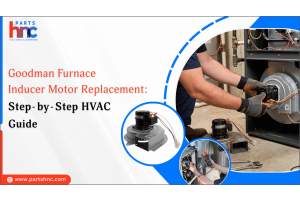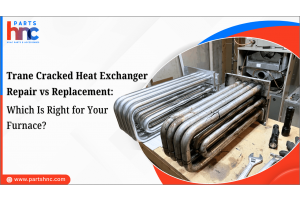Winter Comfort Simplified: Why Upgrading to a Furnace with Refrigerated Air Works
Winter can be harsh, and staying warm at home shouldn’t be a struggle. Many homeowners rely on traditional heating systems that often fall short, leaving some rooms too cold or driving up energy bills. Upgrading to a furnace with refrigerated air offers a modern solution that keeps your home consistently comfortable.
This advanced residential HVAC system for energy-efficient heating not only provides reliable heat but also improves indoor air quality. By using high-quality furnace parts for seamless indoor heating, your system delivers consistent warmth, reduces energy waste, and ensures a cozy, worry-free winter while lowering costs and enhancing overall home comfort.
How Furnace and Refrigerated Air Systems Deliver Seamless Winter Comfort
Winter comfort isn’t just about staying warm; it’s about creating an environment that feels effortless and consistent. Furnaces paired with refrigerated air systems provide both energy-efficient heating systems and indoor air quality improvement.
Key Mechanisms Behind Seamless Comfort:
-
Precision Temperature Modulation: Refrigerated air systems with smart temperature control adjust heat output in real-time, maintaining steady warmth without noticeable fluctuations.
-
Humidity Balancing for Cozier Air: These systems regulate humidity along with temperature, preventing dry air and supporting indoor air quality improvement.
-
Zonal Comfort Without Complicated Ductwork: Advanced designs allow targeted heating in specific areas, reducing energy waste while keeping each room comfortable.
-
Integration with Smart Home Sensors: Modern furnaces connect to occupancy and weather sensors, automatically adjusting patterns for optimal smart temperature control.
-
Reduced Dust and Microbial Growth: Consistent airflow and humidity control discourage mold, mildew, and dust accumulation, improving indoor air quality.
-
Gentle Cycling Extends Lifespan: Smooth start-stop operation reduces stress on components, extending furnace life and creating a reliable dual heating and cooling system.
Pro Tip: Properly calibrate your furnace and refrigerated air system and pair it with smart sensors to maintain a steady temperature, balanced humidity, and efficient airflow. Regularly check filters and perform maintenance to maximize comfort and indoor air quality.
Energy Efficiency Advantages of Upgrading to a Modern Furnace with Refrigerated Air
Energy efficiency isn’t just about lowering bills, it’s about smarter heat delivery and reducing waste in ways older systems can’t. A modern furnace and refrigerated air system leverages design innovations that make every watt count, providing all-season climate comfort for your home.
Advantages of Upgrading to Modern Refrigerated Air Furnaces:
Adaptive Heat Recovery: Some systems reclaim residual heat from the air handler, using it to pre-warm incoming cold air and reduce overall furnace energy usage, making a high-efficiency furnace upgrade even more impactful.
Example: A heat exchanger in the HVAC unit captures warm air leaving the system and transfers it to incoming fresh air, reducing fuel consumption.
Micro-Zonal Airflow Control: Unlike traditional zoning, these systems adjust airflow at the vent level, sending only the precise amount of heated air needed, minimizing energy loss and enhancing all-season climate comfort.
Example: Smart dampers in ductwork open or close based on room occupancy, delivering targeted warmth to bedrooms only when in use.
Phase-Change Heat Dampening: Certain units temporarily store heat in specialized materials, releasing it gradually to maintain temperature with less active energy consumption.
Example: Some furnaces use ceramic heat storage blocks that absorb excess heat and release it slowly, reducing furnace cycling and energy use.
Intelligent Defrost Cycles: Furnace and refrigerated air systems with integrated defrost prevent energy spikes caused by frost buildup, maintaining steady efficiency during cold snaps.
Example: Outdoor coils in a hybrid heat pump system automatically defrost before ice accumulation reduces airflow, keeping the system running efficiently.
Pressure-Sensitive Duct Regulation: Sensors detect and adjust duct pressure in real-time, preventing over-blowing and wasted energy while improving airflow efficiency, a key feature of a high-efficiency furnace upgrade.
Example: Variable-speed fans in the ducts adjust automatically to maintain consistent pressure, ensuring vents deliver just the right amount of air.
Predictive Load Balancing: By analyzing historical usage patterns and outdoor conditions, advanced systems preemptively adjust furnace operation, reducing unnecessary power draw while supporting all-season climate comfort.
Example: A smart HVAC controller predicts colder nights and gradually pre-heats the home, avoiding sudden spikes in furnace energy consumption.
These sophisticated techniques allow refrigerated air furnaces to deliver truly seamless, healthy, and comfortable indoor environments even during harsh winters.
Explore revolutionizing comfort: compact HVAC units offer space-saving design and precise temperature control.
Improved Indoor Air Quality and Consistent Temperature Control in Winter
Winter comfort isn’t just warmth; it’s about creating a home environment that actively supports health and well-being. Modern furnaces with refrigerated air are among the top winter home comfort solutions, achieving this through innovative airflow and air treatment methods rarely discussed in standard heating guides.
How Refrigerated Air Systems Enhance Air Quality and Comfort:
| Note: Furnaces with refrigerated air go beyond heating, filtering allergens, and balancing indoor humidity; however, poor maintenance or airflow issues can reduce their effectiveness. Properly functioning systems ensure consistent warmth and healthier air throughout the winter months. |
Cost Savings, Reliability, and Long-Term Performance Benefits
Investing in a modern furnace with refrigerated air is not just about comfort, it’s a strategic choice for long-term savings and home reliability. These systems are engineered to deliver efficient heating while reducing maintenance headaches over time.
How Refrigerated Air Furnaces Save Money and Last Longer:
|
Feature |
How It Works |
Benefit |
Hidden Advantage |
|
Adaptive Load Distribution |
Dynamically shifts heating loads between zones and vents |
Reduces wear on any single component |
Extends overall system lifespan |
|
Self-Balancing Airflow |
Continuously monitors duct pressure and airflow |
Prevents blower motor strain |
Minimizes maintenance needs |
|
Heat Retention Optimization |
Stores residual heat in insulated vent and plenum sections |
Reduces need for frequent furnace cycles |
Saves energy costs over time |
|
Predictive Energy Modulation |
Uses historical usage and outdoor temperature data |
Minimizes sudden power draws |
Reduces utility bill spikes |
|
Micro-Maintenance Alerts |
Sensors track subtle efficiency drops or airflow blockages |
Allows proactive upkeep |
Prevents major costly repairs |
|
Component Stress Reduction |
Smooth thermal ramp-ups and controlled vent output |
Reduces internal part wear |
Enhances long-term reliability |
|
Deferred Replacement Cycles |
Optimized energy use and reduced mechanical stress |
Maintains performance longer |
Delays expensive system replacement |
Find out how the future of HVAC is green: switching to low-GWP refrigerants reduces environmental impact and boosts system efficiency.
Summary: Why a Furnace with Refrigerated Air Is a Smart Winter Comfort Upgrade
Upgrading to a furnace with refrigerated air isn’t just about staying warm—it’s about creating a home environment that quietly works for comfort, health, and efficiency. These systems deliver subtle benefits that most homeowners never notice until they experience them firsthand. Proper installation and attention to unique features help maximize performance, prevent hidden energy loss, and extend the life of your system.
Key Takeaways:
-
Precision-Climate Balancing: Individual vents subtly adjust airflow in response to furniture, occupancy, and insulation, creating comfort tailored to each room.
-
Hidden Heat Retention: Plenums and duct walls store and release residual heat, smoothing temperature swings and reducing active furnace cycles.
-
Dynamic Air Sanitization: Sensors detect airborne particles and adjust airflow, filtration, and ionization levels to reduce allergens and microbial buildup.
-
Pressure-Harmonic Venting: Fine-tuned room-to-room pressure control eliminates drafts and quietly stabilizes temperature gradients across the home.
-
Thermal Momentum Cycling: The system releases heat gradually, letting rooms retain warmth without frequent energy spikes or loud cycles.
-
Component Longevity Optimization: Vent modulation and gentle startup patterns reduce stress on motors and heat exchangers, extending lifespan.
-
Predictive Environmental Adaptation: Algorithms anticipate weather changes and household patterns to optimize heat delivery and energy use proactively.
Looking to upgrade your winter comfort with a furnace that includes refrigerated air? Shop HVAC replacement parts and supplies with complete system components from PartsHnC. We offer furnaces, air conditioning components, thermostats, and controls from leading brands like Carrier, Goodman, Rheem, Lennox, and York, with fast delivery straight to your door.
References:
https://www.energy.gov/energysaver/heat-pump-systems
https://tristate.coop/advantages-heat-pumps-energy-efficiency
https://www.cleanenergytransition.org/post/why-heat-pumps-are-key-to-building-decarbonization
FAQs
What is a furnace with refrigerated air and how does it work in winter?
A furnace with refrigerated air combines traditional heating with an air system that controls humidity and airflow. In winter, it warms your home while maintaining comfortable moisture levels for consistent indoor comfort.
Is upgrading to a furnace with refrigerated air energy efficient?
Yes, modern systems often feature high-efficiency furnaces and smart airflow control, reducing energy waste. This lowers heating bills while providing consistent warmth throughout the home.
Can a furnace with refrigerated air improve indoor air quality during winter?
Absolutely, it filters dust, allergens, and airborne particles while controlling humidity. This creates cleaner, healthier air and prevents dry or overly damp conditions.
How much does it cost to upgrade to a furnace with refrigerated air system?
Upgrades typically range from $5,000 to $12,000 depending on system size, efficiency, and installation complexity. Long-term energy savings often offset the initial investment.
Is a furnace with refrigerated air suitable for all climate zones?
It works best in regions with cold winters and variable humidity levels. In extremely mild climates, the added refrigerated air feature may be less essential.
 Loyalty Program
Loyalty Program











